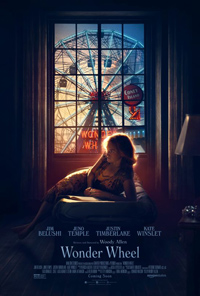The Wheel of Their Discontent: Allen Stages Crumbling Marital Drama in the Dog Days of Coney Island
 As impeccably administered as it is at times roughshod and familiar, Woody Allen returns with more scenes from a troubled marriage in his beautifully photographed Wonder Wheel, featuring an outstanding Kate Winslet in a performance managing to eclipse some of the narrative carelessness. The twilight of Coney Island serves as the resplendent backdrop for DP Vittorio Storaro’s glowing frames, where sunsets and gloamings wash over the faces of its turmoiled heroine and the supporting players in her doomed romantic longing. However, while like the rosy tinted sunset is an arresting sight to behold, it exists because of human pollution—and so is the overarching theme of Allen’s latest—humans in a landscape where artifacts of beauty and wonder have been sullied by the familiarity of its patrons and their suffocating dreams.
As impeccably administered as it is at times roughshod and familiar, Woody Allen returns with more scenes from a troubled marriage in his beautifully photographed Wonder Wheel, featuring an outstanding Kate Winslet in a performance managing to eclipse some of the narrative carelessness. The twilight of Coney Island serves as the resplendent backdrop for DP Vittorio Storaro’s glowing frames, where sunsets and gloamings wash over the faces of its turmoiled heroine and the supporting players in her doomed romantic longing. However, while like the rosy tinted sunset is an arresting sight to behold, it exists because of human pollution—and so is the overarching theme of Allen’s latest—humans in a landscape where artifacts of beauty and wonder have been sullied by the familiarity of its patrons and their suffocating dreams.
In 1950 Coney Island, tired and frustrated waitress Ginny (Winslet) is locked in a loveless marriage with the alcoholic Humpty (Jim Belushi), a carousel operator in the increasingly crumbling conditions of the once vibrant amusement park. Working as a waitress in a local clam bar, a constant sore spot is her 10-year-old son Richie (Jack Gore) from a previous marriage who has a penchant for lighting things on fire. When Humpty’s twentysomething estranged daughter Carolina (Juno Temple) sails into town as an attempt to escape her mobster husband (who wouldn’t possibly think to look for her there), the household seems too tense for Ginny to bear. As luck would have it, a chance meeting with the youthful lifeguard Mickey (Justin Timberlake) soon leads to a steamy, sexual affair. As Ginny plots to run away with her new paramour, however, Mickey finds himself drawn to her stepdaughter.
Like all of Allen’s films, Wonder Wheel enters an arena where it’s in conversation with itself and the pantheon of its director’s repressed, unhappy women who’ve come before. While several elements of Wheel tend to override its otherwise sincerely approached melodrama, this isn’t quite the surprise home-run of 2013’s Blue Jasmine—and yet, Winslet’s Ginny is one of Allen (and Winslet’s) greatest achievements. If Jasmine was clearly a modernization of Tennessee Williams, Allen tries hard to steer inspirational motifs towards another iconic playwright, Eugene O’Neill, whose 1939 classic The Iceman Cometh gets several textual references. But if the handful of tortured folks in Wonder Wheel are akin to the alcoholic escapists of Cometh in that they’re only excited at the prospect of new endeavors, this is still clearly a Williams playground, albeit one with just a tad more dysfunction.
A surprisingly effective Jim Belushi, who somehow makes a character named Humpty seem probable, is engaged in a type of light The Postman Always Rings Twice scenario with Ginny since she clearly feels indentured for favors she can never repay. Their opposing progeny (one a siren, the other an arsonist) pull them apart with such orbital force they seem like a morality play rended from some lesser Greek tragedy. But still, Allen can’t escape the fumes of Streetcar, for like Blanche Dubois, Ginny has that previous love, an ill-fated romance with a drummer, and competes for lust and love with another younger woman, a sister/daughter figure she can’t quite seem to care for (likewise, shades Barbara Stanwyck in the 1952 Fritz Lang/Clifford Odets film Clash By Night as a woman who goes back to her home town and unwisely marries a fish cannery worker make Wonder Wheel feel like its long lost sequel).
The winsome Juno Temple plays Carolina as a melancholy gamine who has just recently lurched out of her naivete. Kindhearted and self-reliant, hers is a difficult character to flesh out, one who could easily be dismissed as a rube, a doe-eyed temptress whose only real weapon is her youth and therefore easy to despise. But Allen allows for subtle moments of emotional duress to build into quiet magnitude—take for instance the sequence where Timberlake’s Mickey confesses the truth of the situation allowing for an empathetic moment of tenderness and guilt Temple displays for the thought of stepmother. However, the glaring weakness here is Timberlake, standing in as the Allenesque connective tissue who narrates the story and perpetrates the dramatic tension.
A passively attenuated lifeguard who supposedly dreams of being a writer, Timberlake seems a bit too worldly to be believable as the naïve lothario to Winslet’s jealousy prone waitress or the unassuming seducer of a younger woman eluding the clutches of the mob (and certainly not someone who would be reading Ernest Jones’ 1949 study on the famed literary figures Hamlet & Oedipus on the Coney Island beachfront). And despite the highly artificial interiors of Humpty and Ginny’s apartment, production designer Santo Loquasto pivots the theatricality into something carnivalesque, for as Winslet whirls from shades of Shirley Booth to Norma Desmond, so do the shadows and fixtures blaze forcefully to life in the metastasizing glow of empty promises and fading romance. If Allen remains besotted with the same types of angsty mavens going on five decades now, this dress may be familiar, but it’s a custom number made only for Kate Winslet.
★★★½/☆☆☆☆☆


